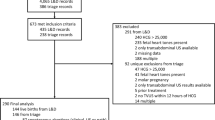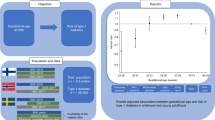Abstract
New proposals for the diagnosis of gestational diabetes (GDM), promulgated by the International Association of Diabetes and Pregnancy Study Groups (IADPSG), will substantially increase the number of women diagnosed with GDM. This will have an enormous impact on healthcare resources, diverting attention away from genuinely high risk diabetic pregnancies. Randomized trials in ‘mild’ GDM indicate that the main effects of treatment are a 2 %–3 % reduction in birth weight, fewer ‘big babies’, and less shoulder dystocia. However, these studies used different diagnostic criteria, and women diagnosed by the broader IADPSG criteria may not derive the same modest benefit. Modeling indicates a very high cost per QALY, unless later development of type 2 diabetes can be prevented. Far from producing consensus, the IADPSG suggestion has thrown sharply into focus the need to assess critically the risks, costs and benefits of adopting criteria that may pathologize a large number of otherwise normal pregnancies.
Similar content being viewed by others
References
Papers of particular interest, published recently, have been highlighted as: • Of importance
• HAPO Study Cooperative Research Group, Metzger BE, Lowe LP, Dyer AR, et al. Hyperglycemia and adverse pregnancy outcomes. N Engl J Med. 2008;358:1991–2002. The HAPO study that related pregnancy outcomes to maternal glycemia on a 75 g OGTT at 28 weeks gestation.
• Crowther CA, Hiller JE, Moss JR, McPhee AJ, Jeffries WS, Robinson JS. Effect of treatment of gestational diabetes mellitus on pregnancy outcomes. N Engl J Med. 2005;352:2477–86. ACHOIS – a large randomized controlled trial of the treatment of mild GDM.
• Landon MB, Spong CY, Thom E, Carpenter MW, Ramin SM, Casey B, et al. A multicenter, randomized trial of treatment for mild gestational diabetes. N Engl J Med. 2009;361:1339–48. MFMU study – a large randomized controlled trial of the treatment of mild GDM.
Jarrett RJ. Gestational diabetes: a non-entity? BMJ. 1993;306:37–8.
Ales KL, Santini DL. Should all pregnant women be screened for gestational glucose intolerance? Lancet. 1989;i:1187–91.
• Metzger BE, Gabbe SG, Persson B, Buchanan TA, Catalano PA, Damm P, et al. International association of diabetes and pregnancy study groups recommendations on the diagnosis and classification of hyperglycemia in pregnancy. Diabetes Care. 2010;33:676–82. The International Association of Diabetes and Pregnancy Study Groups (IADPSG) consensus panel recommendations.
• American Diabetes Association. Standards of medical care in diabetes–2011. Diabetes Care. 2011;24(Supp 1):s1–s61. The ADA explains its rationale for adopting the IADSPG recommendations.
Ryan EA. Diagnosing gestational diabetes. Diabetologia. 2011;54:480–6.
Long H. Diagnosing gestational diabetes: can expert opinions replace scientific evidence? Diabetologia. 2011;54:2211–3.
Cundy T. Proposed new diagnostic criteria for gestational diabetes–a pause for thought? Diabetic Medicine. 2012;29:176–80.
Moynihan R, Doust J, Henry D. Preventing overdiagnosis: how to stop harming the healthy. BMJ. 2012;344:19–23.
HAPO Study Cooperative Research group. Hyperglycemia and adverse pregnancy outcome study: associations with neonatal anthropometrics. Diabetes. 2009;58:453–59.
HAPO Study Cooperative Research group. Hyperglycemia and adverse pregnancy outcome study: associations with maternal body mass index. Br J Obstet Gynaecol. 2010;117:575–84.
Catalano PM, McIntyre HD, Crickshank JK, McCance DR, Dyer AR, Metzger BE. The hyperglycemia and adverse pregnancy outcome study: associations of GDM and obesity with pregnancy outcomes. Diabetes Care. 2012;35:780–6.
• Horvath K, Koch K, Jeitler K, Matyas E, Bender R, Bastian H, et al. Effects of treatment in women with gestational diabetes mellitus: systemic review and meta-analysis. BMJ. 2010;340:c1395. Systematic review and meta-analysis of the RCTs on the effects of treatment in women with GDM.
Farrell T, Neale L, Cundy T. Congenital anomalies in the offspring of women with type 1, type 2 and gestational diabetes. Diabetic Med. 2002;19:322–6.
Cundy T, Gamble G, Townend K, Henley PG, MacPherson P, Roberts AB. Perinatal mortality in type 2 diabetes mellitus. Diabetic Med. 2000;17:33–9.
International Expert Committee. Report on the role of A1C assay in the diagnosis of diabetes. Diabetes Care. 2009;32:1327–34.
Harlass FE, Brady K, Read JA. Reproducibility of the oral glucose tolerance test in pregnancy. Am J Obstet Gynecol. 1991;164:564–8.
Catalano PM, Drago NM, Amini SB. Reproducibility of the oral glucose tolerance test in pregnant women. Am J Obstet Gynecol. 1993;169:874–81.
Sacks DA, Hadden DR, Maresh M, Deerochnawong C, Dyer AD, Metzger BA, et al. Frequency of gestational diabetes mellitus based on IADPSG consensus panel - recommended criteria at collaborating centers. Diabetes Care. 2012;35:526–8.
Hillier TA, Vesco KK, Pedula KL, Beil TL, Whitlock EP, Pettitt DJ. Screening for gestational diabetes mellitus: a systematic review for the U.S. Preventive Task Force. Ann Intern Med. 2008;148:766–75.
• Boershmann H, Pflüger M, Henneberger L, Ziegler AG, Hummel S. Prevalence and predictors of overweight and insulin resistance in offspring of mothers with gestational diabetes mellitus. Diabetes Care. 2010;33:1845–9. Long-term follow up of infants of mothers with GDM and mothers with type 1 diabetes.
Pettitt DJ, McKenna S, McLaughlin C, et al. Maternal glucose at 28 weeks of gestation is not associated with obesity in 2-year-old offspring: The Belfast HAPO family study. Diabetes Care. 2010;33:1219–23.
Gillman MW, Oakey H, Baghurst PA, et al. Effect of treatment of gestational diabetes mellitus on obesity in the next generation. Diabetes Care. 2010;33:964–8.
Kew S, Ye C, Sermer M, et al. Postpartum metabolic function in women delivering a macrosomic infant in the absence of gestational diabetes. Diabetes Care. 2011;34:2608–13.
Fadl HE, Östlund IKM, Magnuson AFK, Hanson USB. Maternal and neonatal outcomes and time trends of gestational diabetes mellitus in Sweden from 1991 to 2003. Diabetic Med. 2010;27:436–41.
Naylor CD, Sermer M, Chen E, Sykora K. Cesarean delivery in relation to birth weight and gestational glucose tolerance: pathophysiology or practice style? JAMA. 1996;275:1165–70.
Donovan LE, Boyle SL, McNeil DA, Pedersen SD, Dean SR, Wood S, Edwards AL. Label of gestational diabetes mellitus affects caesarean section and neonatal intensive care unit admission without conventional indications. Can J Diabetes. 2012;36:58–63.
Lumbiganon P, Laopaiboon M, Gülmezoglu AM, Souza JP, Taneepanichskul S, Ruyan P, et al. Method of delivery and pregnancy outcomes in Asia: the WHO global survey on maternal and perinatal health 2007–2008. Lancet. 2010;375:490–9.
Hales CN, Barker DJP, Clark PMS, Cox LJ, Fall C, Winter PD. Fetal and infant growth and impaired glucose tolerance at age 64. BMJ. 1991;303:1019–22.
Conrad P. The medicalization of society. Baltimore: The John Hopkins University Press; 2007. p. 7–8.
Sackett DL. The arrogance of preventive medicine. CMAJ. 2002;167:363–4.
Neumann PJ. What we talk about when we talk about health care costs. N Engl J Med. 2012;366:585–6.
Werner EF, Pettker CM, Zuckerwise L, Reel M, Funai EF, Henderson J, Thung SF. Screening for gestational diabetes mellitus: are the criteria proposed by the International Association of the Diabetes and Pregnancy Study Groups cost-effective? Diabetes Care. 2012;35:529–35.
Brody H. From an ethics of rationing to an ethics of waste avoidance. N Engl J Med. 2012;366:1949–51.
Kim C, Sinco B, Kieffer EA. Racial and ethnic variation in access to health care, provision of health care services, and ratings of health among women with histories of gestational diabetes mellitus. Diabetes Care. 2007;30:1459–65.
Kieffer EA, Sinco B, Kim C. Health behaviors among women of reproductive age with and without a history of gestational diabetes mellitus. Diabetes Care. 2006;29:1788–93.
Harris MI. Gestational diabetes may represent discovery of pre-existing glucose intolerance. Diabetes Care. 1988;11:402–11.
Royston P, Moons KJM, Altman DG, Vergouwe Y. Prognosis and prognostic research: developing a prognostic model. BMJ. 2009;338:B605.
Disclosure
Conflicts of interest: T. Cundy: none; H. Long: has received honoraria from Eli Lilly, Novo Nordisk, Merck, Aventis, Bristol Myers Squibb, and Roche.
Author information
Authors and Affiliations
Corresponding author
Rights and permissions
About this article
Cite this article
Long, H., Cundy, T. Establishing Consensus in the Diagnosis of Gestational Diabetes Following HAPO: Where Do We Stand?. Curr Diab Rep 13, 43–50 (2013). https://doi.org/10.1007/s11892-012-0330-3
Published:
Issue Date:
DOI: https://doi.org/10.1007/s11892-012-0330-3




